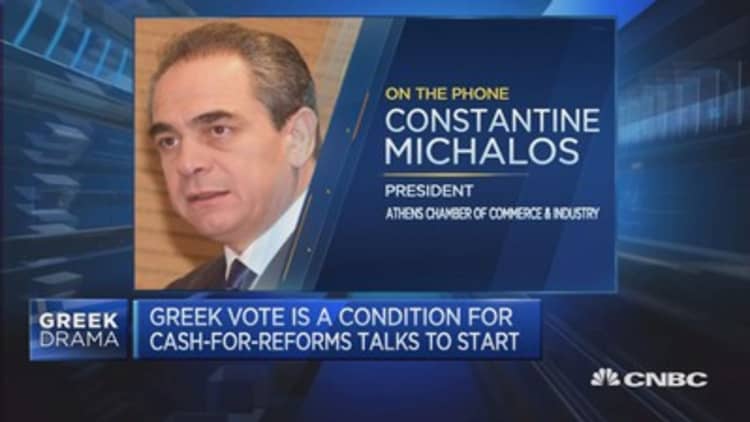
Another day, another make-or-break vote for Greek lawmakers.
The Greek parliament is due to vote late on Wednesday on a second set of reforms demanded by its lenders if it is to receive a third bailout package. But this time, Greek Prime Minister Alexis Tsipras is facing a growing revolt within his left-wing Syriza party over the measures.
Talks over the third bailout program for Greece, worth 86 billion euros ($94 billion) are expected to start once the reforms to Greece's judicial and banking system are passed by the Greek parliament.
In the first parliamentary vote last week on measures (called "prior actions) including a sales-tax hike, around a quarter of Syriza lawmakers rebelled, making the latest vote tough on Tsipras.
It comes as the European Central Bank raises its cap once again on Emergency Liquidity Assistance to Greek banks, by 900 million euros ($980 million), according to news wires citing unnamed sources.
According to a press release detailing the prime minister's remarks to colleagues on the eve of the vote, Tsipras defended his decision to bend to lenders' demands for the bailout.
"Up until today I've seen reactions, I've read heroic statements but I haven't heard any alternative proposal," he said, to what he called the "blackmailing dilemma of July 12" – the day Greece finally capitulated to lender demands for strict spending cuts and tax increases in order to be saved from capital controls, impending bankruptcy and an exit from the euro zone.
Tsipras, who came to power in January on an anti-austerity pledge, has been accused of betraying his party and the Greek people after agreeing to terms that were even tougher than those initially demanded by the country's creditors, who have already provided 240 billion euros to Greece.
Read MoreGreek firms struggling with massive tax hikes
Defending his role in the bailout deal, Tsipras told colleagues that it had allowed Greece to avoid disaster.
"I am fully aware that I took the responsibility of a difficult compromise. A compromise, however, which keeps us alive to continue to fight," he said.
"Tomorrow we vote on the last prior actions and… (then) we must turn our attention to the negotiations for the new loan agreement."
Tsipras energized
Following the vote, there are expectations that bailout talks could start in earnest. Officials from the creditor institutions—the European Commission, European Central Bank and International Monetary Fund—are due in Athens on Friday for meetings with the government, Reuters reported.
Despite the controversy and revolt over the deal, Tsipras can rest assured that Greece has returned to a relatively more "normal" state in the last few days, with Greek banks reopening after three weeks of capital controls. Bridge financing from lenders before the bailout is finalized has also allowed Greece to settle 6.2 billion euros worth of debts with the IMF and ECB this week.
Read MoreECB confirms it has been repaid by Greece
In another positive note for Greece, ratings agency Standard and Poor's raised Greece's sovereign credit rating to CCC+ from CCC- on Tuesday with a stable outlook. S&P said the possibility of Greece leaving the euro zone had "declined to less than 50 percent within our forecast horizon to 2018."
Against a more positive backdrop, Tsipras appeared more authoritative and energized in his speech to colleagues on Tuesday, and he called for an overhaul of the Greek establishment.
Greece needed to work on government policies to address corruption and "vested interests" and needed to change "the political system," he said. It also needed to support the weakest social groups and make an "effort to attract direct investment into the country to offset the recessionary trends in the economy."
Read MoreWhat Greek crisis? In Mykonos, the party doesn't stop
Out of the woods?
The measures to be voted upon on Wednesday relate to reforming Greece's judicial and banking systems. Controversial provisions relating to the early retirement and taxation of farmers are not to be included in the bill Wednesday, making it easier for Tsipras to avoid "negative surprises" according to Wolfango Piccoli, managing director of Teneo Intelligence.
Piccoli said in a note Tuesday that he expected the bill to pass through parliament, given that the thorny issue of farmers' taxation (which could have caused more Syriza defections and threatened Tsipras' hold on power) will be delayed until early August.
That is the vote that could be Tsipras' undoing, however, with opposition MPs (whose support Tsipras has counted upon so far) threatening to oppose the measures. If Tsipras's support base erodes further, Tsipras could be forced to resign, Piccoli said, warning that new elections were still likely later in the year.
"While the removal of these controversial measures means that negative surprises are unlikely for Tsipras in Wednesday's vote on the next package, the public debate about early elections in September/October is picking up. As mentioned previously, our baseline scenario is that Greece will return to the polls before the end of the year," he said.
- By CNBC's Holly Ellyatt, follow her on Twitter @HollyEllyatt. Follow us on Twitter: @CNBCWorld


